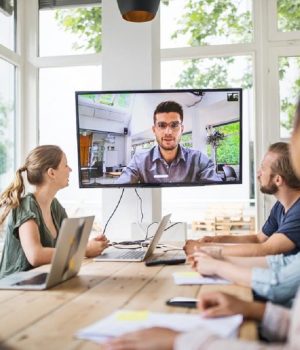Companies have come to embrace hybrid work as a permanent fixture of Australia’s future professional landscape.
But reengaging a workforce in 2022 after almost two years of global turbulence and disruption remains a key challenge.
Therefore, for business leaders to enable productive hybrid work, while still drawing workers to a physical environment to collaborate, innovate and foster company culture, will often require companies to embrace efficient and realistic coworking and flexible workspace models.
Office occupancies plummeted by up to 26% during the peak of the pandemic in Melbourne and Sydney, according to a Property Council of Australia survey in 2021.
And while workers have become comfortable working away, we’ve also seen sentiment fall towards working from home and a growing desire to regularly connect at the office.
Workers open to hybrid and remote work strategy
In a recent CBRE survey of Asia Pacific, more than half of all respondents (54%) wanted to work from the office at least three days a week.
We’ve seen enterprises focus on policy transformation as they look to the future.

Major enterprises like Westpac and Afterpay are encouraging 2-3 day a week in the office, while others like Atlassian have already come out with bold “remote-first” working policies that see workers only required at the office four times a year.
Leaders in the SME space including Mantel Group and Who Gives a Crap have also been praised for their innovative flexible working models.
But policy forms just one part of the solution to achieving employee retention.
As a crucial next step, decision-makers must focus on redesigning their physical workplaces to ensure employees have exciting reasons to visit the office.
For flexible workspace organisations, we’ve spent the past year focused on how to reinvigorate the workplace and reengage employees in a post-pandemic future.
More than just the space, the best talent is demanding an experience more akin to a hospitality operation. Facing heightened standards, businesses are outsourcing the office to workspace experience experts so that they can get on with running the business.
Business leaders opting for hospitality-first approach
Hub and other premium flex operators have long since included a hospitality-first approach that delivers a café, fitness studio, podcasting rooms, relaxation spaces and hotel-style end-of-trip facilities within a premium architectural work environment.

Through providing hospitality offerings to its members, Hub has been able to witness the benefits beyond providing an enjoyable workspace.
Regular social events see businesses serendipitously network, while there are larger personal and professional events held once a month both in-person and online.
These events don’t just grow networks on a personal level, but also grow businesses.
As worker demands evolve, flexible workspaces can help decision-makers ensure their physical domain is up-to-date with the latest tech, health and safety offerings.
So while hybrid work is being embraced through policy transformation, we believe a business plan to transform physical workspaces is equally as important.
Flexible workspaces, innovation hubs and work-near-home solutions can make this shift as seamless as possible and can be a worthy next step in the process.
One way Hub is exploring these third spaces is through a pilot alliance with WOTSO to extend working opportunities to near to home locations in the suburbs.
Adaptive workplaces can help carve out a company’s identity, while offering workers a chance to develop their skills, excel at work and socialise with a broader network.
By delivering customer service, premium amenity and a sense of community, ongoing business success can naturally be fostered.
Incentives that draw people back to the office, even just once a week, can enable collaboration and innovation that simply can’t be replicated in the at-home environment.
If businesses can effectively reengage their workforce through not just policy, but place, a shift to a happier and more productive workforce could become COVID-19’s silver lining.
Brad Krauskopf is the Chief Executive Officer & Founder of Hub Australia







![Need cash for your startup or innovation? Here’s the Ultimate Grant Guide for Innovators and Startups [FREE DOWNLOAD]](https://anthillonline.com/wp-content/uploads/2015/10/INNOVATORS-GRANT-GUIDE-NFSU-page-spread-300x194.png)
![The Top 5 Most Insanely Dumb Mistakes made by Rookie and Seasoned LinkedIn Users, with David Hobson [FREE REPORT]](https://anthillonline.com/wp-content/uploads/2015/07/Screen-Shot-2015-11-26-at-14.29.18-100x75.png)
![Three easy wins when using LinkedIn with David Hobson [FREE REPORT]](https://anthillonline.com/wp-content/uploads/2015/08/3quick-wins-100x75.png)
![Seven steps to crafting the perfect email, with James Tuckerman [FREE REPORT]](https://anthillonline.com/wp-content/uploads/2015/08/7-steps-cheatsheet-3d-cover-nuova--100x75.png)
![Learn how to use Instagram as a business tool [FREE INFOGRAPHIC]](https://anthillonline.com/wp-content/uploads/2012/12/nickelbackinstagram-100x75.jpg)
![Five ways to manage your time by managing yourself, with Helen Ebdon [CHEAT SHEET]](https://anthillonline.com/wp-content/uploads/2015/07/ebdon-3d-cover-01--100x75.png)

![What are the odds you’ll be an astronaut? One in 13.2 million, but you’ve got at least a one in three chance of something else [VIDEO]](https://anthillonline.com/wp-content/uploads/2012/11/OneinTwo.jpg)
![The Ultimate Social Media Almanac with James Tuckerman [Cheat Sheet]](https://anthillonline.com/wp-content/uploads/2015/11/Screen-Shot-2015-11-26-at-11.24.55-300x194.png)
![Five essential things to get right if you want to raise capital, with Bryan Vadas [FREE CHEAT SHEET]](https://anthillonline.com/wp-content/uploads/2015/08/vadas-3d-cover-01--100x75.png)
![Four principles to creating dedicated customers…or zombie loyalists with Peter Shankman [Free report]](https://anthillonline.com/wp-content/uploads/2015/11/Screen-Shot-2015-11-26-at-11.16.26-100x75.png)
![How to secure lucrative sponsorships in five steps [CHEAT SHEET]](https://anthillonline.com/wp-content/uploads/2016/02/jackie-fast-meme-04-100x75.jpg)
![New Zealand’s Xero eyes US IPO, further disruption as subscribers increase [INFOGRAPHIC]](https://anthillonline.com/wp-content/uploads/2014/07/sruuuuujana-212x194.png)
![Ever wonder if your ‘content marketing’ is really just crap? You gotta see this! [INFOGRAPHIC]](https://anthillonline.com/wp-content/uploads/2014/08/content-100x75.jpg)
![7 Business Lessons From Game of Thrones [INFOGRAPHIC]](https://anthillonline.com/wp-content/uploads/2014/10/infographic-games-of-thrones-041-100x75.jpg)
![How to build your own Media Empire… In seven steps with Nathan Chan [INFOGRAPHIC]](https://anthillonline.com/wp-content/uploads/2014/10/Nathan-Chan-Infographic-e1413419529176-100x75.jpg)
![5 Business Lessons From Tinder [INFOGRAPHIC]](https://anthillonline.com/wp-content/uploads/2014/10/Tinder-Elegant-Infographic-100x75.jpg)



